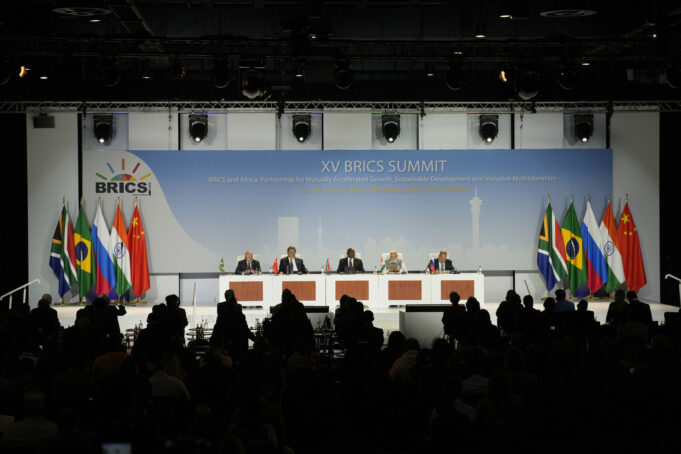Many observers and analysts framed the recent BRICS Summit held in South Africa as a challenge to the Western-dominated global order. The group’s increasing economic clout included the addition of six more nation-states, making it “BRICS Plus.”

Economist Redge Nkosi, the Pretoria-based founder and executive director of First Source Money and Public Banking of South Africa, who participated in the summit, begs to differ. BRICS—Brazil, Russia, India, China and South Africa—is filling a void left by the United States and Europe and their declining global financial influence, Nkosi argued.
He is a former member of the administration of Nelson Mandela and a current member of the think tank created by the BRICS Summit. Nkosi said that the “consolidation (of the Global South) which is long overdue,” represents the decline of Western imperialist powers. He spoke to Africa Watch from Johannesburg.
“This is a consolidation that’s going to be a counterweight … to the dying economy of the U.S. and Europe, whose dynamism was dependent on the exploitation of Africa, of Asia and Latin America. And that exploitation is coming to an end,” he said.
In addition, noted Nkosi, Western powers’ history of reneging on, or half-hardily responding to promises made has left a bad taste in the mouths of Global South countries.
A case in point was during the closing of the June 2023 New Global Financial Pack Summit in Paris. At the summit, South Africa President Ramaphosa addressed French President Emmanuel Macron and said, “Promises that have been made, have not been fully lived up to. …”
A long-standing pledge, among a laundry list of failed promises, was to deliver $100 billion that was promised by Western nations to assist developing countries mitigate climate damages that rich nations are responsible for.
Nkosi noted that the Global North unwilling or unable to honor their promise “only leads to formations like BRICS, to take over geopolitical space that has long been vacated by these dying economies of the West.”
According to Thomas Fazi, in demographic and economic terms, “the power of the BRICS, especially in light of its recent expansion,” which includes Argentina, Ethiopia, Iran, Saudi Arabia, and the United Arab Emirates, is all too evident. Fazi is a columnist and translator at “Unherd,” a news and opinion website and co-author of The Covid Consensus.
“With its new members, the bloc will represent almost half of the global population. In terms of purchasing power parity (PPP), the most appropriate measure for comparing the relative economic size of countries, it already represented nearly one-third of global GDP—more than the U.S.-led G7’s economies, which account for 30 percent. The latest (country) additions will bring its share up to 37 percent,” said Fazi.
The idea for BRICS “was to create a club of nations that’s not going to be influenced by the West,” Nkosi pointed out. “This was done so they could pursue their economic and political affairs free from the dangerous influence of the G7 and the Western nations,” he said.
According to Nkosi, highlights of the summit included, “as a matter of great urgency migrating away from the use of the U.S. dollar to the local currencies of the BRICS countries.” That’s a fundamental issue, and one that’s going to alter the geopolitical power balance globally, in favor of developing countries, he explained.
Touting the growing strength of BRICS, Nkosi said, “Walking away from the clutches of imperialism is the freedom most of the economies in the Global South have been wanting to do, however, they didn’t have the mechanism, nor the clout individually to pull it off.”
He said with the creation of BRICS and now BRICS Plus “that realization is finally here.”
Nkosi sees the BRICS Summit as “a seismic shift in the geopolitical landscape that can’t be ignored.”
Fazi said, based on the substance of the summit, the gap between the BRICS Plus will only widen, “considering that emerging and developing countries are predicted to grow at much higher rates in the coming years, and that more countries are likely to join (BRICS). More than 40 countries have reportedly expressed interest in joining, and 22 of them have formally asked to be admitted. In other words, the overwhelming majority of the world’s population lives in countries that are either already in the BRICS or aspire to be.”
Follow @JehronMuhammad on X, formerly known as Twitter.













